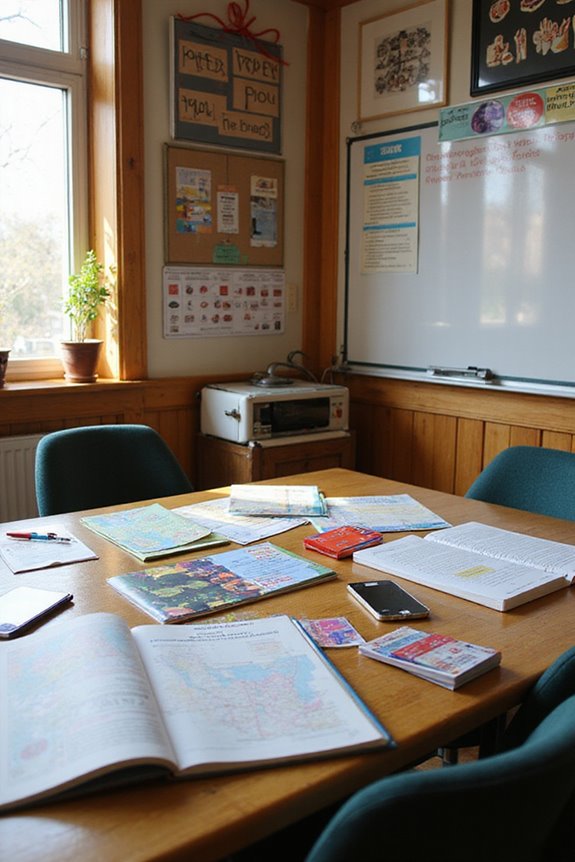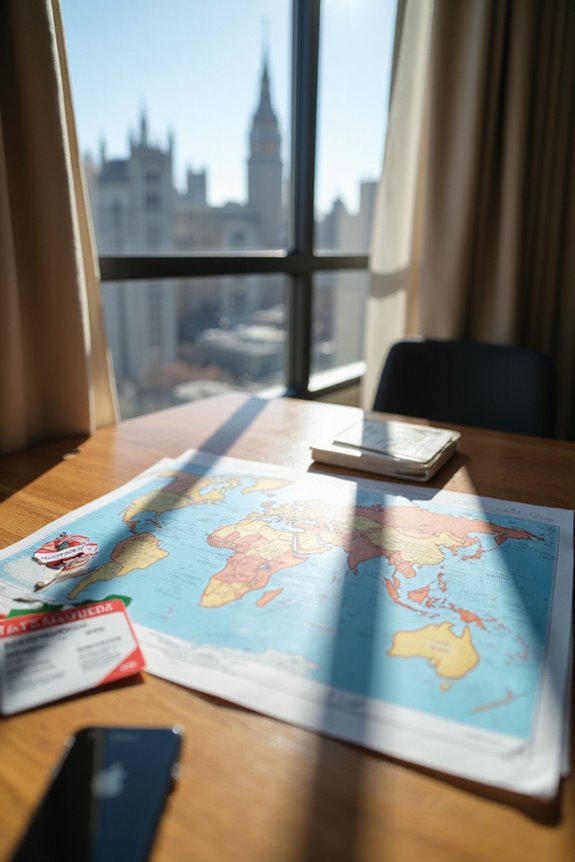Finding sign language interpreters while traveling can be a breeze! I usually start with international directories, like the Registry of Interpreters for the Deaf. Local Deaf associations are gold mines for connections too—they know the best interpreters in the area. Can’t forget online platforms for on-demand services; they’re super convenient! And don’t overlook embassies for recommendations. Trust me, the right interpreter makes all the difference, and there’s so much more to explore!
Key Takeaways
- Utilize international interpreter directories to locate skilled interpreters by filtering for language, location, or specialization.
- Connect with local Deaf associations for access to certified interpreters familiar with regional sign dialects.
- Explore online platforms for on-demand interpreter services that can be accessed via mobile or laptop.
- Engage with embassies and consulates for recommendations on local interpreter services and Deaf organizations.
- Verify professional certifications to ensure the competency and qualifications of interpreters for your specific needs.
Utilizing International Interpreter Directories and Organizations
When I’m traveling, one of the first things I do is check out international interpreter directories, and let me tell you, it can be a game changer. I’ve found that these directories, like those from the World Federation of the Deaf or the Registry of Interpreters for the Deaf, really simplify things. They connect me with skilled interpreters who understand my needs perfectly. With international collaborations at play, I can access a vast network of professionals. Plus, I love how I can filter by language, location, or even specialization. Imagine needing a Deaf interpreter specializing in Spanish—it’s all just a click away! Utilizing these resources makes my travels smoother, ensuring I can communicate effectively wherever I go.
Connecting With Local Deaf Associations

Have you ever wondered how to connect with local Deaf associations while traveling? It’s easier than you might think! These associations are like community hubs, making local connections that can lead you to qualified interpreters. They often have directories filled with certified interpreters who understand the local sign dialects and cultural nuances. Plus, they can help arrange interpreter services for everything from medical appointments to social events. I remember attending a local Deaf event where interpreters were readily available, making communication seamless. Engaging with these community resources not only guarantees you get the support you need but also enriches your travel experience by connecting you to the vibrant local Deaf culture. Reach out, and you’ll be amazed at what you find!
Exploring Online Platforms for Interpreter Services

How do you find the right sign language interpreter while traveling? One of my go-to methods is exploring online platforms. With on-demand services, I can access ASL interpreters instantly, which is a lifesaver! Plus, I love that I can do it all through my phone or laptop—no need for advance booking. I always check interpreter reviews, as they give me confidence in the service. If I have a specific meeting, I also use scheduled virtual interpreting services, allowing me to book the same interpreter for multiple sessions. It’s efficient and makes communication smoother. Whether it’s for a business meeting or a casual chat, these platforms have made my travels so much easier, breaking down those pesky language barriers!
Engaging Embassies and Consulates for Recommendations

If you’re planning to travel and need a sign language interpreter, reaching out to embassies and consulates can be a game-changer. I remember my trip to Spain; I contacted the local embassy and made some great embassy inquiries. They not only provided interpreter referrals but also tips on local Deaf organizations that could help. Some embassies even allow you to bring your own interpreter to appointments, which made me feel at ease. Just make certain to check their requirements, like submitting your interpreter’s credentials beforehand. Trust me, these connections can save you a lot of stress and guarantee smooth communication. So, don’t hesitate to tap into these resources; they might just make your travels a lot easier!
Understanding Professional Certification and Qualifications

Finding the right sign language interpreter isn’t just about making a connection; it’s also about understanding what qualifications to look for. The certification importance can’t be overstated—interpreters often hold credentials from the Registry of Interpreters for the Deaf, like the National Interpreter Certification or Certified Deaf Interpreter. These certifications require a bachelor’s degree and passing tough exams, guaranteeing they’ve got the skills needed for effective communication. Plus, specialized certifications help interpreters shine in specific contexts. I remember hiring an interpreter with a CDI credential, and it made a world of difference! When traveling, always check their qualifications overview to confirm you’re getting the best support possible. Trust me, it’s worth the effort!
Navigating Demand and Availability Challenges
While traveling, it can feel like a game of hide-and-seek when you’re trying to find a qualified sign language interpreter. Demand fluctuations can be wild, especially during peak seasons or major events. I remember searching for an interpreter in a remote town, feeling the accessibility barriers loom large as I navigated limited options. The national shortage of interpreters doesn’t help either; it can be tough to secure one, particularly in less urban areas. Sometimes, I’ve even found myself resorting to remote services, hoping for the best. It’s like a scavenger hunt—exciting yet frustrating! So, be prepared for the unexpected, and keep your spirit up, because finding that perfect interpreter can sometimes feel like finding a needle in a haystack!
Leveraging Technology and Remote Interpretation Options
When you’re on the road, having the right tools can make all the difference, especially when it comes to finding a sign language interpreter. I’ve found that leveraging video technology is a game-changer. With video remote interpreting (VRI) services, I can connect with certified interpreters anytime, anywhere, as long as I have an internet connection. Plus, mobile apps like “ASL Interpreter” can help me communicate without needing an interpreter on-site. I love how these remote solutions make travel smoother—whether I’m at a hotel or a local café. And let’s not forget about wearable tech like smart glasses, which can discreetly translate signs. Embracing these tools really enhances my travel experience and keeps communication flowing!
Frequently Asked Questions
How Can I Ensure Interpreter Services Are Culturally Appropriate for My Destination?
To guarantee interpreter services are culturally appropriate for my destination, I prioritize cultural sensitivity and seek interpreters familiar with regional dialects. I also engage local Deaf organizations for insights and recommendations tailored to the community’s needs.
What Should I Do if My Interpreter Cancels Last Minute?
If my interpreter cancels last minute, I’d immediately reach out to emergency contacts for alternative options. I’d also check local Deaf organizations and consider video remote interpreting to guarantee communication continues smoothly.
Are There Additional Costs for Specialized Interpreting Services?
When traversing the sea of interpreter pricing, I’ve found specialized services often carry hidden cost factors. Like treasure maps, they reveal additional fees based on specific needs, ensuring the right expertise is always within reach.
How Do I Provide Feedback on Interpreter Services Received?
When I provide interpreter service feedback, I focus on specific observations and use effective communication tips. I aim for constructive dialogue, highlighting strengths and areas for improvement to support the interpreter’s growth and overall service quality.
Can I Request a Specific Interpreter for My Trip?
Yes, you can request a specific interpreter for your trip. Just keep in mind that interpreter availability and the booking process can vary, so it’s best to submit your request well in advance to guarantee accommodation.





